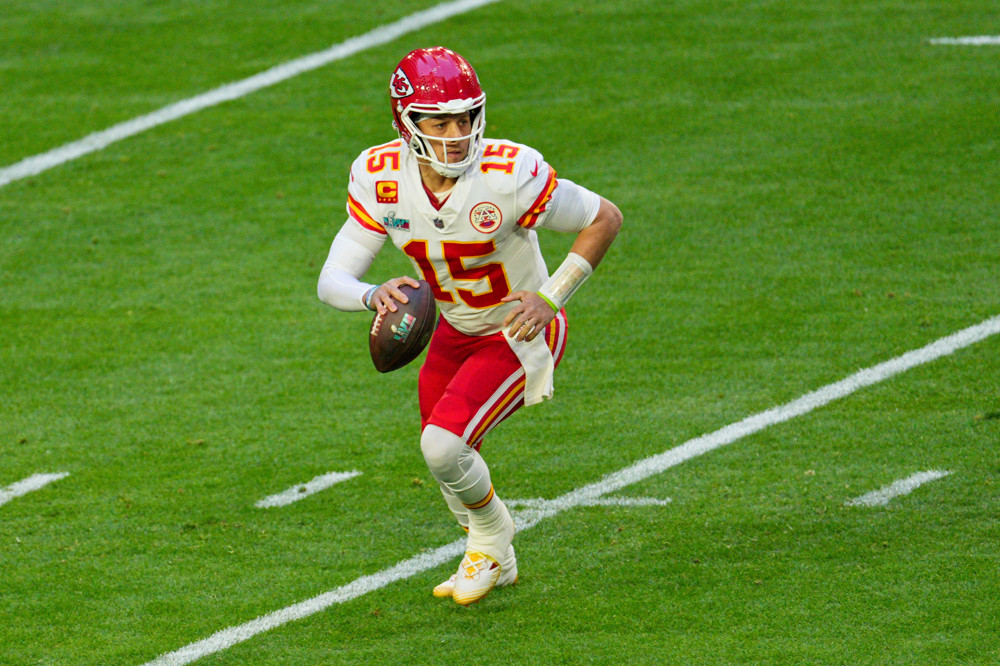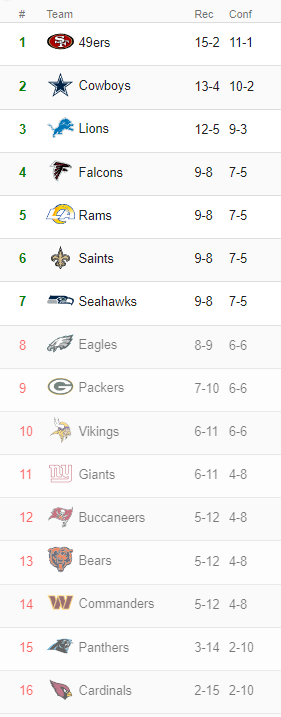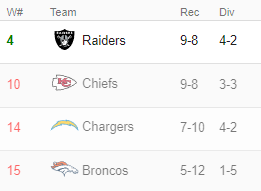Week 8 Playoff Picture Update: Just How Safe are the Eagles and Chiefs?
10 min read
Chiefs QB Patrick Mahomes
The defending conference champions are having a pretty good 2023, all things considered.
On Sunday, the Philadelphia Eagles rebounded quite nicely from their Week 6 stumble by crushing the Miami Dolphins on Sunday Night Football, turning one of the most potent offenses in the game one-dimensional in a 31-17 statement win, finally looking like the Super Bowl contenders we all know they ‘really’ are. And over in the AFC, the Kansas City Chiefs haven’t stumbled since Week 1, rattling off six straight wins and holding every single opponent this season under 21 points. Both teams are over 98% in FTN’s playoff odds; the surest bets in the league.
It’s pretty good to be 6-1, in other words. While no one’s been perfect this season, last year’s crème de la crème have come the closest, and look to be cruising through the regular season on their way to meaningful football in January. And will both teams having a DVOA of at least 18.7%, there’s no lucky flukes here. This isn’t a case like the 2015 Falcons, who started the season 6-1 with a 2.9% DVOA and ended up crumbling to 8-8 – these teams are for real.
Not that there is no history of teams getting off to a hot start and then fading, mind you. The 2012 Bears started out 6-1, with the top-rated defense in the league leading them to a 22.7%. But their luck flipped over the back half of the season, and hard. They scored just nine touchdowns in the second half of the season, stumbled to 10-6, and missed the playoffs on the divisional record tiebreaker to the Vikings – though they would have been the seventh seed, had it existed back then. Or there’s the 2009 Broncos, 6-1 with a 24.9% DVOA before the bloom fell off of Josh McDaniels’ rose, falling all the way to 8-8 and into the theoretical ninth seed in the AFC. The 2003 Vikings (21.2%), 2002 Chargers (18.9%) and 2002 Saints (21.5%) join that ignoble club, all failing to cash in on a 6-1 start.
So, while the Eagles and Chiefs can all be very proud of what they’ve done so far, 6-1 doesn’t guarantee anything; nothing is clinched in October. Even though each team could theoretically lose the rest of the way and make the postseason, or win any random seven games left on their schedule and clinch a spot, there’s always a chance that a crucial injury or a string of bad luck could see them on the outside looking in. So what would it look like for these three teams to stumble? What are the nightmare scenarios for our 6-1 duo?
Philadelphia Eagles
The Eagles are, by at least one metric, the more vulnerable of the two 6-1 teams, because they actually have a live draw in their division. While it would take a minor miracle for the dregs of the AFC West to get out of their own way and provide a serious challenge to Kansas City, the Eagles have a live draw in the shape of the Dallas Cowboys in the division. With two games left between Philadelphia and Dallas, it’s not that difficult to imagine ways in which the Eagles drop out of contention in the NFC East. Dallas starts to become relevant for divisional title consideration once they get to 10 wins. The seventh seed in the NFC should be comfortably below that, so we don’t need to spend too much time worry about exactly what will happen to the Cowboys in this scenario. We can just trust Mike McCarthy and his men to remain at least somewhat competent, and focus on the wild card teams instead.
And that’s where we run into some real trouble. We have to put three different wild card teams ahead of Philadelphia, and the bottom of the race is a real mess at the moment. The seventh seed is currently the 3-3 Buccaneers, with the Vikings, Rams, Commanders and Saints all at three wins as well. Assuming we use the four-win Seahawks as one of our outs, we need to pull two teams out of that quagmire and stick them ahead of Philadelphia. It’s a motley crew, and it doesn’t help that only Washington has any more games against the Eagles. And do you trust Sam Howell to stay upright for longer than a few seconds against the fifth-hardest remaining schedule, per DVOA? I don’t.
FTN’s playoff simulations have the Saints far and away the best of that lot, averaging 8.9 wins per scenario, so we’ll use them as one of our targets. Second place technically belongs to the Buccaneers at 7.6, but that’s a bit of an issue – the Bucs still play the Saints in Week 17, and some of their win projection comes from potentially beating New Orleans then, which we would prefer not to happen. Instead, we’ll use the Rams, just behind Tampa Bay at 7.5 wins, as our other target. That feels right, at any rate – what Sean McVay has been able to construct in the passing game feels more solid than Baker Mayfield and company in Tampa Bay, with the combination of Cooper Kupp and Puka Nacua providing a strong one-two punch. Philadelphia has the head-to-head win over both the Buccaneers and Rams, at any rate, so there’s no real benefit to us picking one or another, so Rams it is.
That’s our starting point for the scenario. The NFC West produces three teams with winning records, as both Los Angeles and Seattle punch above their projected weight class. The NFC South, too, sees two teams with winning records, as we funnel some wins away from Tampa Bay to Atlanta and New Orleans. 9-8 teams abound across the NFC. Can we have Philadelphia be one of them, or do we need to knock them all the way to a losing record before getting rid of them?
That depends, of course, on exactly how the Eagles lose. To get to 9-8, we can only spot Philadelphia three more wins. If all three wins are against NFC teams, that will put Philadelphia at a 7-5 conference record, which is probably too strong to whiff entirely on. The easiest way to get everyone needed to 9-8 has them all also at 7-5 conference records, which would send things to the strength of victory tiebreaker. Well, the Eagles have a really good strength of victory tiebreaker, and tough opponents left on the slate. Even if we work to minimize Philadelphia’s potential strength of victory by having their three wins be the Giants-Cardinals-Giants series at the end of the year, we still have problems. Sure, we can bump the Seahawks over Philadelphia thanks to their Week 15 matchup, but the Eagles already have the head-to-head win over the Rams in Week 5. As for the Saints? If New Orleans and Philadelphia tie in conference record, that goes to common games – the Bucs, Rams, Giants, Vikings and Patriots. Well, New England already has four wins in those six games, and we’d be spotting them two more with the Giants at the end of the year!
No, no, that simply won’t do. We can probably knock a 9-8 Eagles team out of the picture if one of their wins comes against the AFC, but as their two remaining interconference games are against the Chiefs and Bills, it’s just easier on everyone if we knock ‘em all the way down to 8-9 and forget about tiebreakers entirely.
So that’s your nightmare scenario. Jalen Hurts continues to turn the ball over – only Desmond Ridder has more giveaways than Hurts so far this season – and a secondary that has allowed an above-average 227.4 passing yards per game with only three interceptions remains middling, at best. Philadelphia is swept by Dallas in the battle to decide the NFC East, and end up splitting the season series with both Washington and New York as well. They then end up losing every game against other realistic contenders, with the Week 11-15 run against Kansas City, Buffalo, San Francisco, Dallas and Seattle putting the final nails in their coffin. That gives you an 8-9 Eagles team sitting at home in January.

Kansas City Chiefs
The AFC wild card picture is much stronger than the NFC, and also almost entirely irrelevant for our purposes. Why? The AFC West stinks.
The Chargers are, charitably, average, with a very bad defense letting them down left, right and center. The Raiders and Broncos are, by DVOA, the worst two teams in the conference. You’re likely going to need 10 wins to be in play for the wildcard, and I don’t trust any one of the three teams there to get within spitting distance of that number. The Raiders and Broncos might not get to ten wins combined. And yet, we need at least one of these teams to catch Kansas City if we want to knock the Chiefs out of the postseason. We’re supposed to find a hero out of this bunch? We’re doomed.
Let’s rule the Broncos out; they can barely avoid tripping over their own feet. The question then is whether the Chargers or Raiders are more likely to get to .500? In a vacuum, the answer is Los Angeles, but the Raiders have a win in hand. We’re going to be giving each a win over Kansas City in this scenario – yes, yes, I know, but the Chiefs are going to have to blow some things to get knocked out of the playoffs – so the question is whether it’s easier to find five wins for Las Vegas or six wins for Los Angeles?
Surprisingly, I think my answer is the Raiders. They have five remaining home games, all of which seem winnable – the Giants, Jets, Vikings, Chargers and Broncos. Yes, Las Vegas hasn’t exactly been the Black Hole to this point, but it’s not like the Chargers can boast a thrilling home field advantage in their pocket, either. It’s certainly more appealing than Los Angeles’ home slate, which includes Detroit, Baltimore and Buffalo alongside Denver and Chicago. The Raiders’ passing attack hasn’t been that bad when Jimmy Garoppolo has been at the helm – an 8.5% DVOA, which would be merely below average rather than the horror show Brian Hoyer and Aidan O’Connell have provided this season. And hey, maybe Josh Jacobs can run one (1) play for positive yards! Wouldn’t that be fun and exciting? So yes, and I’m as astonished as you are that I’m saying this, but the best hope we have to keep the Chiefs out of the playoffs is the continued competence and progress of Josh McDaniels’ offense, with Las Vegas sweeping their home games the rest of the way to get to 9-8. Did I mention we’re doomed?
That is all well and good, but we still have to get the Chiefs to eight losses for any of this to matter at all. We are going to make things as easy on ourselves as possible by having Kansas City fold in the division, splitting the season series with all three AFC West opponents. That gives the Chiefs a 3-3 divisional record, and since Las Vegas already has a road win over Denver in Week 1, it would put Kansas City firmly behind Las Vegas’ 4-2 divisional record. So we only need four more losses, rather than a full five. Small favors.
Miami, in Germany, seems like an obvious pick; the Dolphins are a threat to score 40 points at any given time. Buffalo hasn’t looked like the AFC contenders we were expecting them to be, but we’ve seen what Josh Allen and company are capable of on a good day, and maybe Week 14 can be one of those good days. I don’t think anyone would be shocked, at least, if the Chiefs dropped both of those games. We also have Philadelphia coming to Arrowhead in Week 11 in a Super Bowl rematch; that’s another good one to pick, too. Is it likely Kansas City drops all three games against other contenders? No, probably not. Is it correct to call Buffalo a contender, considering where they’re currently at? Maybe not, either. But if we’re looking for the bottom to fall out in Kansas City, here’s where you start.
That leaves us needing one more loss from the group of Green Bay, New England, Cincinnati or Las Vegas a second time. Joy. Take your pick – I think the odds the Bengals recover enough by Week 17 to look like the team we thought they could be before the season began is your best bet there, but any and all of them don’t seem particularly appealing.
That’s what you’ve got to do, though. Kansas City’s drop problem never fully goes away, as the lack of a true top receiver provides a bit of a drag to even what Patrick Mahomes can do. Teams find they can run all over a relatively weak Kansas City front, shortening games and preventing Mahomes-to-Travis Kelce magic wherever possible. And the Chiefs, despite a 9-8 record, end up staying at home.

Showing what’s required for the Eagles and Chiefs to miss out on the playoffs helps make their situations feel tangible, in a way that saying they have a 98% chance of making the postseason doesn’t, really. Yes, it’s possible, if everything goes wrong, for a 6-1 team to end up collapsing over the rest of the season. But seeing all the moving parts that go into something like that happening helps crystalize just how strong a position Kansas City and Philadelphia are actually in at this point.
